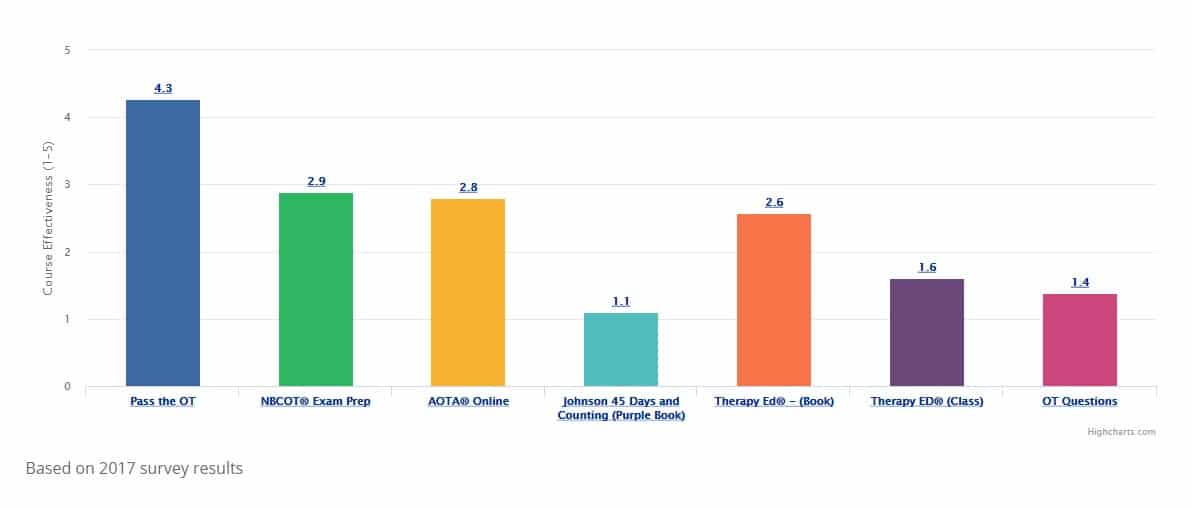
Studying for the #NBCOT® exam can be daunting, overwhelming, and often quite stressful. The questions on the test are designed to get students to second guess themselves. Therefore, it is more than common for students to have to take this exam multiple times before passing. To get a 450 score requires focused study, efficient use of a student’s time, commitment, and an in depth understanding of what the questions are asking, and not making the following mistakes:
1. Being a Generalist Instead Of a Specialist
 Instead of taking cumulative practice tests and studying flashcards on all topics, it is important to master one topic at a time and then move on to the next topic. It is not feasible to study all topics at once, and it only creates confusion. Often students also make the mistake of focusing on their strengths first and reviewing material they already feel quite comfortable with instead of focusing on their weaknesses first.
Instead of taking cumulative practice tests and studying flashcards on all topics, it is important to master one topic at a time and then move on to the next topic. It is not feasible to study all topics at once, and it only creates confusion. Often students also make the mistake of focusing on their strengths first and reviewing material they already feel quite comfortable with instead of focusing on their weaknesses first.
2. Not Creating a Study Schedule
Some topics such as pediatric development require much more time and concentration than other topics such as Glasgow coma scale. One needs to allocate time accordingly. It is recommended that students study 4 – 8 hours per day, 6 days a week, for at least 6 to 8 weeks in order to properly process and understand the test’s material. Students can also make the mistake of over studying and burning themselves out. Studying more than 8 hours per day is not sustainable or advised. Students will also make the mistake of not setting a test date or waiting too long to set a test date. This only leads to procrastination which creates test anxiety and makes it harder for them to retain the information they learned while studying.
3. Having Too Many Resources and Not Using the Right Resources
Some recommended resources are outdated, disorganized, and provide students with material that is not relevant to this test. Studying for this test is incredibly time consuming. It is important that students primarily study the topics that will most likely show up on the exam and gain expertise in them rather than focusing on all topics.
4. Not Studying According To Your Learning Style
Some students can study effectively by reading a book all day long while others are more auditory, visual, and kinesthetic learners. There are alternative methods to study for this test efficiently such as tutoring, using audio records, watching movies, working with the right study partner, or volunteering in different occupational therapy settings.
5. Not Being Held Accountable
 Without someone to be accountable to, many students study only what they are comfortable with and already know, instead of studying the material that challenges them. Having a tutor for the NBCOT® exam who can hold students accountable can help avoid unnecessary frustration and keep efficiency high when studying. Working with an expert tutor can also build your confidence, reduce test anxiety, test critical thinking and relevant interventions and make sure all the most important topics are covered before moving onto the next topic. It is important to make sure that students clearly understand the questions that are being asked as well as the clinical reasoning behind the questions.
Without someone to be accountable to, many students study only what they are comfortable with and already know, instead of studying the material that challenges them. Having a tutor for the NBCOT® exam who can hold students accountable can help avoid unnecessary frustration and keep efficiency high when studying. Working with an expert tutor can also build your confidence, reduce test anxiety, test critical thinking and relevant interventions and make sure all the most important topics are covered before moving onto the next topic. It is important to make sure that students clearly understand the questions that are being asked as well as the clinical reasoning behind the questions.
6. Over-Analyzing the Questions and Changing Answers
Over analyzing exam questions makes most students second-guess themselves. It is important to be mindful, focused and clear in thinking when choosing an answer. It is important for a student to mark their best guess at the time and not change answer choices. Knowing the material in depth and having experts that you can discuss the material with before the test can help alleviate this problem.
7. Being distracted while studying
When you study with a friend or if you study on your own, you can easily become distracted by social media, the cell phone, taking a snack break, watching television, or going to the bathroom. It’s important to when you study make that time count. Make your setting time efficient and effective. If you are not in the mood to study take a break. Studying with a friend may seem like a good idea but can it can also be a time waster. Often when you study with a partner you talk about your weekend or your day or how you’re doing. It may not always be efficient and effective. Your partner may not be at the same level of knowledge that you may be at and you may find yourself teaching them or they may be teaching you. When it may be more effective to just study on your own.

8. Over Studying, and Not Being Balanced.
Drinking too much caffeine, eating too much sugar, not sleeping properly nor exercising, and over studying can be problematic on test day as well. It is important to be well rested, focused, and not overwhelmed when taking the NBCOT® exam.
9. Not Realizing What Not Passing Really Costs
Often students make the mistake of thinking that not passing the NBCOT® exam only costs them their testing fee of $550. This is a huge oversight. In reality, not passing could also mean losing a job opportunity or losing 2 months of potential work which could be worth anywhere between $6,000 and $12,000. When students don’t pass, often their confidence is also decreased. This can lead to worse performances on future tests and explains why some students have taken this test over nine times.
10. Letting Test Anxiety and Past Failures Lower Your Confidence
Many times students will make careless mistakes on material that they already know especially if they are anxious. Often times student scores may often go down instead of up after taking repeated tests. Instead of feeling defeated it is important to remain positive, motivated, and confident. Participating in daily meditation, having the right study plan and taking practice timed exams can help drastically reduce anxiety on test day. Also, working with a tutor can significantly improve a student’s confidence which can alleviate this problem.
11. Doing the same thing and expecting a different result
Repeating the same study habits and study prep methods after failing the NBCOT® exam and hoping that you will get a better outcome is a mistake that many students make. If your method didn’t work, change your method – study the material differently, invest in a tutor,or partner with someone to study with. Don’t find yourself in the same boat as many other students, taking the exam three, four or up to nine times. Furthermore, it is a mistake for students to think that they will easily pass that if they failed by 10 points or less. Being overconfident can easily lead to another failure. Instead, students should aim to score a 500 on their next exam so that they do not take any chances on not passing.
If students really want to give themselves that extra edge with passing the occupational therapy certification there is no better study prep for the NBCOT® exam than Pass the OT. It is the most efficient, effective, and affordable solution. Their program consists of a comprehensive web course complete with international educational resources, 1600 up-to-date practice questions, 18 hours of audio recordings, videos on topic matter, as well as timed and untimed quizzes that simulates the NBCOT® exam. Pass the OT also provides optional personal tutoring via skype and phone with licensed, seasoned therapists. Tutoring will get students ready for the NBCOT® exam sooner, hold them accountable, and help them stay focused while keeping them challenged, building their confidence, and providing them with tools to lower test anxiety. Different packages are available that can best fit a student’s needs. Sign up today for a free trial at PassTheOT.com to see what OT and OTA test taker are raving about.
Passtheot.com is not endorsed or affiliated with The National Board For Certification in Occupational Therapy, NBCOT®. NBCOT® is a registered trademark owned by The National Board For Certification in Occupational Therapy. Pass the OT LLC is independently owned and operated.”




